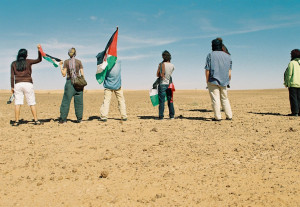The Wall of Sands: A Moroccan-Swedish quicksand?
In 1975, Spain agreed to split the Western Sahara between Morocco and Mauritania in the Madrid Treaty. This decision, made without consulting Algeria or the local Sahrawi population, has spurred tension ever since. On February 27, 1976, the Polisario Front, with the support of Algeria, proclaimed the Sahrawi Arab Democratic Republic (SADR). Morocco has refused to recognize SADR sovereignty. The “Mur des Sables” (Wall of Sands), often pejoratively referred to as the “Wall of Shame”, was built by Morocco and has enabled it to control about two-thirds of the territory. The wall is constantly manned with 100,000 Moroccan soldiers, and the surroundings of the wall have been equipped with artillery ports and mines. Although the wall was originally built to keep out the guerilla forces, it has led to the displacement of many Sahrawis. To this day, the United Nations High Commissioner for Refugees has recorded about 200,000 Sahrawis living in Algerian or Mauritanian refugee camps, and 90,000 remain unable to return to their lands.
Since 1991, the UN Mission for the Referendum in Western Sahara (MINURSO) has monitored both sides of the wall and has continued to demine the region. Only 20% of the mines have been cleared and every year many Sahrawis are maimed or killed because of the more than 5 million mines remaining.
Recently, tensions have arisen between Morocco and Sweden over the sovereignty of the SADR. According to Moroccan governmental sources, the intention of the Swedish government to recognize the independence of the SADR triggered a diplomatic crisis between the two countries. On September 28, Prime Minister Abdelilah Benkirane, urgently summoned representatives of Parliament and of unions to discuss the matter. The same day, the Swedish firm, IKEA, was informed that it did not meet the requirements to open its first store in the Kingdom.
During the following days, thousands of Moroccans protested in front of the Swedish Embassy in Rabat. The protests were, “organized by the monarchy and the state,” according to the Swedish newspaper Expressen. The Swedish government has disagreed with Moroccan assumptions. “The Swedish government has not taken any decision related to acknowledging the independence of the Western Sahara, and there is no intention to take such a decision,” reported the Swedish Foreign Ministry.
The Moroccan government has announced that it is considering a boycott of Swedish firms and products in retaliation to the efforts of the Swedish government and to the progressive Swedish boycott of Moroccan products and investment opportunities,. Moreover, according to Al Massae, the Moroccan security forces have received instructions to prevent Sahrawis with Algerian or Mauritanian passports from entering the Kingdom. The newspaper claims that Moroccan authorities consider such people to be “suspicious elements” engaging in “security espionage” for Algeria. The Kingdom of Morocco has also engaged in the trenching and fencing of the Algerian border.
Today, most countries recognize the right of self-determination or of independence of the Sahrawis. Yet, France, Russia, China, and the United States still advocate for the incorporation of the region into Moroccan territory either completely or with some elements of autonomy. A concerted coalition of influential countries, such as the United States and France, would be far better positioned to enact change in the same vein as the risky, unilateral Swedish diplomatic action. Morocco’s dependence on the EU as their primary economic partner could help induce negotiations, especially if France considered a revision of its foreign policy towards the Western Sahara, and backed a strong EU-concerted policy balancing economic pressures and incentives.

